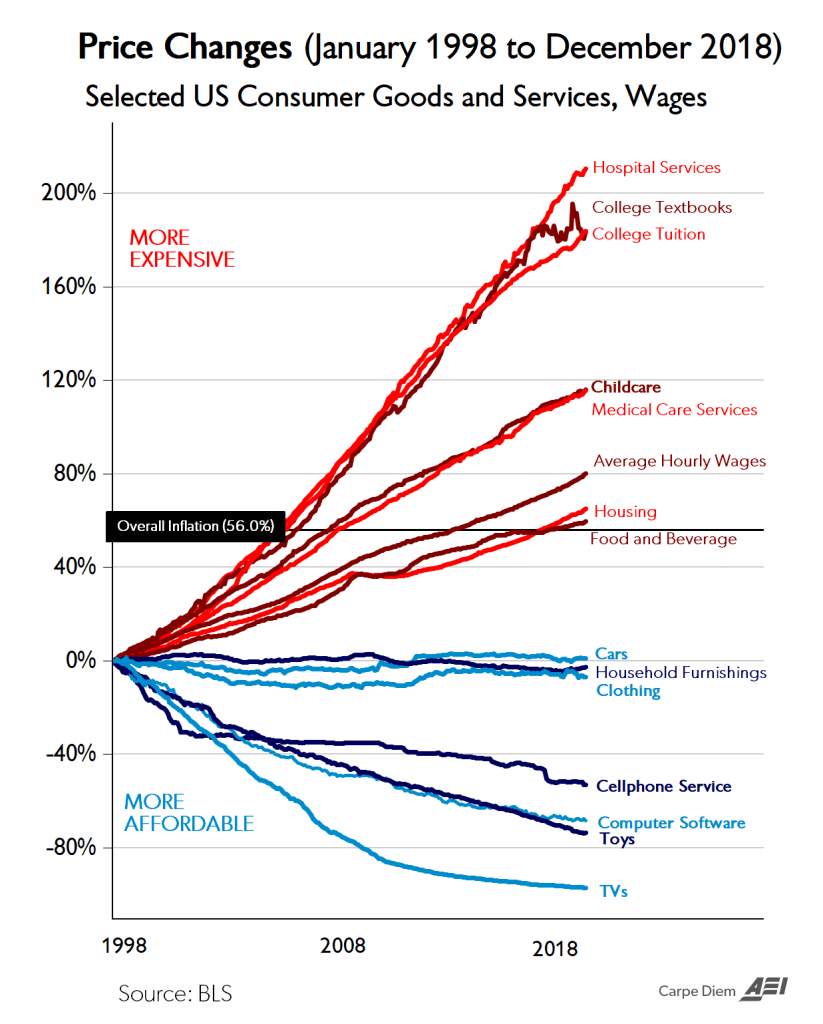A couple years ago, Mark Perry published a chart showing the change in prices of goods and services over time.

The chart has become something like a Rorschach test, where people magically interpret it as confirmation of what they already believe. Globalists point out the low-cost benefits of outsourced manufacturing; Libertarians blame government intervention for price increases in healthcare and education; Socialists see the same price gains and attribute it to Baumol’s Cost Disease, because they believe that human labor confers some irreproachable value regardless of productivity.

I was in Cuba X years ago, where X is some number greater than the statute of limitations for OFAC violations. What struck me was how closely the Cuban economy mirrors that of the US. And by “mirror”, I mean everything is the exact opposite.
In Cuba, health care and education are Free, and toys and food are expensive. Well technically toys and food are free too, if you don’t want very much. Every Cuban receives a ration book that entitles them to five eggs a month and, for those with children, three toys a year. If you want more than that, you pay up on the black market.
(Don’t @ me — Cuba trumps the US in terms of literacy rate, life expectancy, and infant mortality.)

Turns out everyone is absolutely right about that inflation chart. Globalization has indeed made manufactured goods dirt cheap in the US. A quick way to similarly reduce health care and education costs might be to send students and patients offshore, like the Mariel boatlift in reverse. As for Libertarian complaints of regulatory capture — if we rationed toys the way we ration physicians and college diplomas, toys would be expensive too. But the Socialists are smartest of them all. Baumol was right — Healthcare and education are overpriced because the opportunity cost of labor is high.
Cuba gets it. By running an authoritarian commie state, they don’t waste human resources on politics and media and bankers and other parasites. That frees up a lot of manpower for people to become doctors.
In Capitalism’s defense, well, free-market capitalism has never really been tried.
It only takes a team of a few hundred engineers to design a phone which can sell for $billions. Meanwhile, a team of a few hundred doctors can barely keep a hospital open.
Thus while the opportunity cost of competent people’s time is expensive, in some industries you can amortize the costs over many customers while in others they can’t.
The solution is probably to demand less pointless medicine and pointless education.
Re: “pointless medicine” — career mobility is difficult within medicine. Eg, my dad is a doctor who specializes in infectious diseases (ebola, HIV, hepatitis). His colleagues joke that they study “poor man diseases” because only poor ppl get those diseases and there’s not much money in the field (as opposed to, say, oncology or cardiology). This was not the case 30 years ago when they first went into medicine. A doctor can’t switch specialties without starting all over with training, so those doing pointless medicine are trapped for the rest of their careers, and resources are pretty much always going to be inefficiently allocated.
re: “pointless medicine” I was thinking more of low-benefit high-cost treatments which tend to cluster with end-of-life care.
w.r.t. credentials – it’s the flip side to your “no engineering license” post. A doctor can’t credibly switch specialties (or gather the necessary credentials), but someone who can write VHDL code designing chips can probably also easily portray themselves as “developer” if needed. While this means the “developer” profession is full of poseurs and carpetbaggers, it does mean that one can switch specialties pretty easily.
Low-benefit/high-cost treatments are symptoms of the underlying problem, which is pricing opacity. If hospitals were upfront about the fact that it cost $10k per day to keep your dying grandma alive in the hospital, I think more people would have difficult conversations about whether to continue treatment.
Incidentally, I used to have a job doing chip design with VHDL. If Intel hadn’t replaced all its engineers with H1B workers, I might still be doing that. On the other hand, it was pretty easy for me to find a subsequent software job in an unrelated field. If engineering licenses were in fact a thing, I’d probably have a less enjoyable job, but with a higher salary.